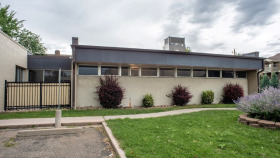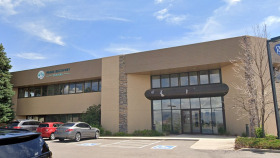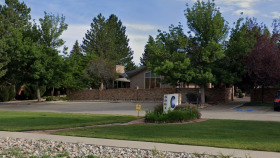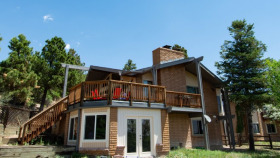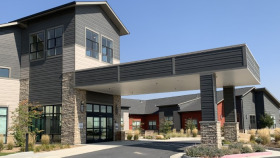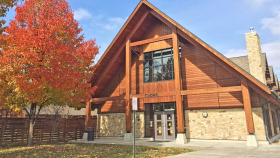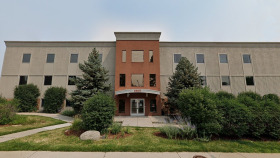Expert Insights
HB22-1326, known as the Fentanyl Accountability And Prevention Act, is a new Colorado state bill focused on fentanyl. And it has some experts worried the state’s addiction treatment industry will soon be flooded with a number of patients they’re simply not equipped to handle. Among several other changes, this new bill requires anyone convicted of fentanyl-related charges must be assessed by a professional and potentially ordered into treatment for fentanyl addiction. It feels like this could potentially snowball into an enormous problem that takes precious treatment resources away from those people who are dedicated to their recovery.
~ Olivia Pennelle
How Much Does Drug Rehab Cost in Colorado?
Colorado is ranked 11th nationwide in terms of addiction treatment affordability, with an average cost of drug and alcohol rehab of $56,413 (without insurance).
- Medical detox is the most expensive, with an average cost of $139,079
- Long-term inpatient drug rehab in Colorado costs an average of $49,781
- Outpatient addiction treatment in Colorado costs an average of $8,272
- Outpatient methadone treatment is the most affordable, with an average cost of $7,349
Addiction treatment costs are variable. Luxury rehabs with resort-like amenities can cost tens of thousands of dollars for a 30-day stay. More typical inpatient programs are less costly, and outpatient programs may be even more affordable. The final price tag for Colorado drug rehabs will depend on multiple factors, including:
- Whether the program is inpatient or outpatient
- The location of the facility
- Which insurance plans the program accepts
- The special amenities provided
- Length of stay
Inpatient programs tend to have higher costs. Staying on-site for treatment requires paying for housing and meals, as well as the counseling and medical care associated with treatment. Different facilities have different pricing scales depending on the services and amenities they include. Outpatient treatment is less expensive because it does not include housing, meals, and certain medical services.
How to Pay for Drug Rehab in Colorado
As of 2024, there were over 450 drug rehab facilities across the state of Colorado. These facilities accept several payment methods. Of those treatment facilities, the following numbers reflect how many accept their respective payment methods:
Paying for addiction treatment in Colorado can be challenging, but it’s not impossible. Low cost and free rehab help reduce or eliminate the financial burden associated with substance abuse treatment.
Although finding treatment options that meet your financial ability may feel difficult, healthcare professionals are well aware that the cost of going without rehabilitation is far higher when you count the cost of drugs, loss of employment, damaged relationships, and possible incarceration.
Private Pay + Insurance
Most commercial health insurance plans and policies offer coverage for substance abuse treatment. This is mandated by two federal laws: the 2008 Mental Health Parity and Addiction Equity Act and the 2010 Affordable Care Act. While these federal laws cover most insurance plans, there are exceptions, so you must verify your insurance coverage before beginning treatment.
Some people choose private pay even when they have health insurance coverage. This reduces the potential that an employer will discover they require addiction treatment. The following is a list of commercial insurance companies that provide coverage in Colorado:
- Anthem Blue Cross and Blue Shield of Colorado
- Cigna Health and Life Insurance Company
- Denver Health Medical Plan, Inc.
- HealthNetCo Insurance Agency
- HMO Colorado, Inc.
- Humana Health Plan, Inc.
- Kaiser Foundation Health Plan of Colorado
- Rocky Mountain Health Maintenance Organization
- Select Health
- United Healthcare Services, Inc.
- UnitedHealthcare of Colorado, Inc.
Medicaid
Medicaid is a health insurance program funded by state and federal funds but administered by the state. Eligibility requirements include several criteria such as income, being a citizen of the U.S. or certain qualified non-citizens, having an active Social Security card, and being a resident of the state of Colorado.
Medicaid helps pay for substance abuse treatment and co-occurring mental health conditions. Health First Colorado is Colorado’s Medicaid program. Health First provides you with a primary care provider within your regional organization. Individuals with complicated needs can contact their primary care provider or regional organization for care coordination, to get help with things like transportation, finding a specialist, or getting help with substance abuse treatment.
Medicare
Medicare is a federally funded health insurance program designed primarily for people 65 and older and those with certain disabilities. There are four parts to Medicare. Medicare Part A pays for inpatient hospitalizations, including inpatient or residential substance abuse treatment. Medicare Part B is outpatient services, including therapy and outpatient care for mental health conditions and substance abuse treatment.
Medicare Part C is also called Medicare Advantage plans. These are premium based policies offered by commercial health insurance to administer and manage Medicare Parts A and B. These plans sometimes offer additional benefits. Medicare Part D covers drug coverage, including drug substitution for opioid use disorders. Colorado’s Department of Regulatory Agency administers senior healthcare and Medicare and helps enrollees navigate the system. More than 1 million Colorado residents are enrolled in the Medicare program and roughly 51% have also purchased Medicare Advantage plans.
Military Insurance
TRICARE is Military Insurance that covers active duty military personnel, veterans, and their families. TRICARE is available worldwide and separates the U.S. into two regions. Colorado is covered in the West region by Health Net Federal services.
Many of Colorado’s veterans are also eligible for Medicaid. Eligibility for medical care through the VA health care does not affect Health First eligibility and may offer additional resources to individuals, such as substance abuse treatment. Enrollment in VA health care ensures you can receive immediate health care benefits in more than 1,700 places across the U.S. There’s no enrollment fee, premiums, or deductibles, and most veterans have no out-of-pocket costs.
Tribal Funding and Programs
According to the American Library Association, Indigenous Nations native to Colorado make up approximately 1% of the state’s population. The state maintains a directory of resource managers throughout the state called the Colorado Tribal Contacts List. The Substance Abuse and Mental Health Services Association has a Tribal Opioid Response Grant to help address the opioid crisis in tribal communities across the U.S.
Colorado also has a Land-based Tribe Behavioral Health Services grant program to provide infrastructure improvements in behavioral health facilities that serve the Indigenous population. Colorado Grant Watch treatment and prevention grants, seven of which are grants to help tribal entities address substance abuse problems.
Other Low Cost Options
There are several financial options to help lower the cost of alcohol and drug rehab. A personal loan is the fastest way to start substance abuse treatment. A personal loan from the bank offers greater confidentiality, while a loan from friends and family typically has a far lower interest rate and more flexible repayment plan.
Consider working with the financial counselor at your treatment center to find other options that reduce your out of pocket cost. If you don’t have a commercial health insurance policy, you may qualify for Medicaid. Some addiction treatment centers offer payment plans or sliding scale fees when you provide documentation of your income level and ability to pay.
Faith based organizations are usually nonprofit and offer help with payment. Local organizations may offer grants and scholarships and you might consider fund raising from friends, family, or crowd funding sources.
Free Addiction Treatment Resources in Colorado
Drug and alcohol rehab is not a luxury. Instead, it’s a necessity to achieve sobriety and sustainable recovery. Several free rehabs in Colorado can help you meet your needs. Substance abuse programs offered in local addiction treatment centers typically include inpatient and outpatient care, alongside detox and aftercare services.
Free and low cost rehabilitation programs may accept commercial insurance coverage, government grants, and state and federal sponsored health coverage. Some free and low cost addiction services are offered by nonprofit organizations and others offer payment assistance programs. Unfortunately, cost is often a significant barrier to pursuing treatment. The cost of alcohol and drug rehab can be overwhelming if you’re also facing poverty, addiction, homelessness, and lack of employment.
Free and low cost substance abuse treatment options can be found throughout the state. While Colorado does not directly operate addiction treatment centers, they do provide oversight regulation, and financial support for people who are uninsured or underinsured. There are several ways to pay for addiction treatment in Colorado, including options that don’t require emptying out your pockets.
Colorado Veterans Project
This nonprofit organization helps veterans build a strong economic future. Several programs help meet the needs of veterans, including financial and legal services and educational opportunities.
Rise Above Colorado
This state wide organization helps change the perceptions and attitudes about the risks of substance abuse in teenagers using an evidence based approach to help them make healthy decisions. They connect people with community resources for support and addiction treatment.
Colorado Consortium for Prescription Drug Abuse Prevention
The consortium helps coordinate the state response to drug abuse, including prescription medication, fentanyl, stimulants, and sedatives. They collaborate with state and federal agencies and grassroots organizations to help fund 11 groups that focus on different aspects of addiction, such as prevention, education, treatment, and recovery.
Young People in Recovery
This national nonprofit organization has chapters in 17 states and 8 chapters throughout Colorado. They support young people struggling with substance abuse and in treatment or recovery. They help young people in the criminal justice system and provide life skills training for young people aged 14 to 18 years.
Centers for American Indian and Alaska Native Health
The organization is the largest and most comprehensive program of its kind in the U.S. They use research, education, and information dissemination to help improve the health and wellness of Native American people.
Colorado Drug Use Statistics
In 2021, 16% of adults in Colorado say they used drugs (excluding cannabis) for non-medical reasons.1

5% of men admitted to using drugs, while nearly 14% of women admitted to drug use.

24% of black residents reported using drugs, while 16% of white and Hispanic residents admitted drug use.

People earning less than $25,000 per year had higher rates of drug use than those with higher incomes.

16% of high school graduates reported using drugs, compared to 19% with college education.
In 2021, about 19.7% of adults in Colorado reported excessive drinking, including past-month binge drinking or heavy drinking. That figure is above the national average of 17.6%.2
Nearly 27% of adults between 18 and 44 engaged in excessive drinking.
Almost 23% of men engaged in excessive drinking, compared to 16.6% of women.
Multi-racial, white, and American Indian/Native Alaskan residents reported nearly equal rates of excessive drinking at around 22%.
People making at least $75,000 per year were engaged in the most excessive drinking behaviors.
Drug Laws in Colorado
DUI
Fines for driving under the influence of alcohol and drugs can cost up to $13,000. Conviction can also result in incarceration, probation, and an ignition interlock device. If your blood alcohol level is over 0.08%, the law doesn’t require any further proof of impairment.
Marijuana/Cannabis
Colorado was one of the first states to legalize recreational use and since then the laws have been broadened, including increasing the legal possession limit. Use is legal in the state by an adult over age 21, in private, and in possession of less than 2 ounces. Open display or public use of 2 ounces or less is a petty offense and 6 ounces or more is punishable by 18 months in jail and up to $5,000 in fines.
Drug Testing
Federal law requires testing by employers in some industries, such as aviation and transportation. However, states are responsible for mandating other testing. Colorado does not have legislation to cover circumstances where a private employer can do drug testing. While there are no legal protections for employees, testing may result in other legal claims.
Substance Use Commitment
The court system can issue an involuntary commitment for substance abuse, which is reserved for people who have refused treatment, are psychiatrically stable, are at risk to themselves or others because of their substance abuse, and are medically stable. The individual has the legal right to contest the commitment.
Resources
- America’s Health Rankings. (2021). Non-Medical Drug Use – Past Year In Colorado.
- America’s Health Rankings. (2020). Excessive Drinking In Colorado.
- Medicare.gov. (2022). Inpatient hospital care.
- Medicare.gov. (2022). Mental health care (outpatient).
- Health First Colorado. (2022). Mental Health, Substance Use Disorder, or Behavioral Health Services.
- Colorado General Assembly. (2019). Offense Level For Controlled Substance Possession.
- Colorado Revised Statutes. (2022). Colorado Revised Statutes
Title 18 – Criminal Code Article 18 – Uniform Controlled Substances Act of 2013 Part 4 – Offenses and Penalties § 18-18-405. Unlawful distribution, manufacturing, dispensing, or sale. - Colorado Judicial Branch. (2022). Drug Court.
- Colorado Department of Public Health and Environment. (2022). Naloxone standing orders.
- Colorado Department of Public Health and Environment. (2022). Colorado public health harm reduction legislation.
- Colorado public health harm reduction legislation. (n.d.). Department of Public Health & Environment. Retrieved October 21, 2022, from https://cdphe.colorado.gov/prevention-and-wellness/colorado-public-health-harm-reduction-legislation
- Update! Colorado drug laws 2022. (2022, July 5). Wolf Law LLC. https://wolflawcolorado.com/update-colorado-drug-laws-2022/
- Key substance use and mental health indicators in the United States: Results from the 2016 national survey on drug use and health. (n.d.). Retrieved November 11, 2022, from https://www.samhsa.gov/data/sites/default/files/NSDUH-FFR1-2016/NSDUH-FFR1-2016.htm
- Substance Abuse and Mental Health Services Administration. (2021). Facility Locator. from
https://findtreatment.samhsa.gov/locator








